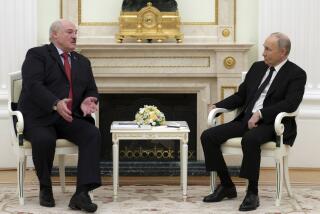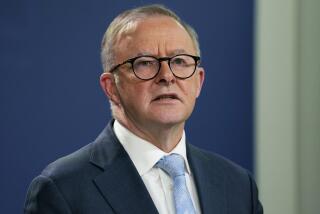Yeltsin Puts Off Japan Visit--Again
- Share via
MOSCOW — Jilting the Japanese for the second time in eight months, Russian President Boris N. Yeltsin has abruptly postponed a visit to Tokyo he had tentatively scheduled for the end of May.
The unexpected move raised diplomatic hackles in Tokyo, which only last month approved a $1.8-billion aid package for Russia after much arm-twisting by Japan’s Western allies.
On Thursday, Japanese and Russian diplomats tried to play down tensions, saying that the May 25-27 state visit had never formally been announced.
“You cannot postpone what has not been scheduled,” Russia’s deputy foreign minister, Georgy F. Kunadze, said at a Moscow news conference called hastily to control damage. “There is no crisis in relations between Russia and Japan.”
Yeltsin will visit Tokyo in July when the Group of Seven major industrialized democracies meet in the Asian capital and later, perhaps in the fall, will go ahead with a plan to visit Japan for bilateral talks, Kunadze said.
Although Yeltsin’s office said the postponement was mutually agreed upon, Japanese Foreign Ministry officials insisted that no such mutual accord had been reached.
Yeltsin’s decision to give Tokyo a second cold shoulder is seen as likely to aggravate Japanese antagonism toward Russia.
Under pressure from Russian right-wing forces, Yeltsin has stalled on Tokyo’s demands for the return of four islands north of Japan that were seized by the Red Army after World War II. Tokyo had once firmly refused to grant aid to the new, democratic Russia until the islands dispute was resolved. But it softened its position to help ensure success for the July economic summit.
With Japan’s economy in a slump, the $1.8-billion aid package has domestic detractors, not least of them a popular weekly magazine that recently ran a feature titled “Let Yeltsin Starve to Death.”
Yeltsin irked the Japanese last September by bowing out of a state visit at the last moment. The Russian president, whose diplomacy has been a slave to his domestic political situation, said he could not travel abroad while his country was in turmoil.
Still, that sudden cancellation not only embarrassed Japan’s leaders but also stuck them with cancellation fees for a lavish reception they had planned in Yeltsin’s honor.
Last month, Yeltsin stunned Tokyo again by telling reporters--before he informed his prospective hosts--that he planned to visit Japan in May. Unnamed Japanese officials were quoted in the press scolding Yeltsin for not going through “proper channels.”
But the Japanese government welcomed the visit, and its diplomats were soon reassuring the public that talks with Russia were “showing progress.”
Reports that the Russian president would again be a no-show reached Tokyo on Wednesday. Asked about the postponement, Prime Minister Kiichi Miyazawa said tartly: “I heard that information this morning. I suppose we will eventually hear something from them (directly). After all, there are procedures for this kind of thing.”
The Itar-Tass news agency reported that a high Japanese official hinted that the lion’s share of the $1.8-billion aid package--insurance for Japanese-Russian joint ventures--might not be deliverable “if the crisis of commercial and economic relations between the two countries is not overcome.”
Diplomat Kunadze said Russia and Japan had simply not had enough time to prepare for a summit. But Japanese commentators said the Russians got cold feet when they realized they had misunderstood Japan’s position on the islands.
Japan had promised not to raise the territorial issue during the economic summit in Tokyo, but the Russians mistakenly assumed that the issue would not come up in bilateral talks either. During an unofficial visit to Tokyo to plan the meeting, Kunadze apparently was surprised to learn that the islands were still on the Japanese agenda.
“There is no point in going if the Japanese are set to dwell on the disputed islands again,” said Andranik M. Migranyan, a member of Yeltsin’s presidential council. “Yeltsin can go to the (Group of Seven) summit and, in the framework of it, discuss the territorial issue. . . .”
A leader of the National Salvation Front, an ultra-nationalist group that Yeltsin once tried to ban, gave notice Thursday that Russian conservatives do not intend to hand over the four disputed islands without a fight.
“Unless Yeltsin successfully establishes a dictatorship, he can’t give away the islands to Japan. . . ,” said lawmaker Nikolai A. Pavlov. “While the Parliament still operates, it will never allow the president to give away chunks of our territory.”
More to Read
Sign up for Essential California
The most important California stories and recommendations in your inbox every morning.
You may occasionally receive promotional content from the Los Angeles Times.













